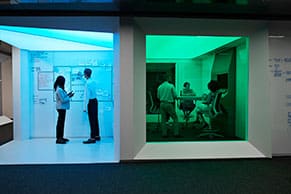If there’s one thing that’s constant in the service-focused hospitality industry, it’s change. In a sector where success depends on the guest experience and satisfaction, businesses must keep pace with shifting customer expectations and demands, advancements in technology, industry disruptions and intense competition. Understanding the trends shaping the industry can empower hospitality leaders to make the most strategic investments in people, technology and processes — and come out on top.
What Are Hospitality Industry Trends?
Following significant financial challenges brought on by the pandemic, the global hospitality industry has been on a positive trajectory in the past couple of years. The market expanded from $4.673 trillion in 2023 to $4.993 trillion in 2024, representing a compound annual growth rate (CAGR) of 6.8%, according to The Business Research Company. On the travel side of hospitality, most travelers globally are planning to take the same number or more trips in 2025 compared to 2024, with many expressing interest in exploring new destinations, according to a report by the Centre for Aviation. In the U.S. restaurant industry, sales are projected to reach $1.1 trillion in 2025, marking a 4% increase from 2024, as reported by the National Restaurant Association.
Experienced hospitality leaders know that it’s never safe to rest on their laurels and will continually scan the environment for opportunities and threats. Customer requirements shifting fast, and competitors, new and old, are exploring the latest technologies, products and even business models. To maintain positive momentum, decision-makers must understand current and emerging trends and determine how to most effectively integrate them into their organizations.
Key Takeaways
- The hospitality industry is in a continual state of flux as customer preferences, technology capabilities and the competitive landscape evolves.
- It’s essential for hospitality companies to monitor and assess industry trends to determine which ones are most relevant to their businesses.
- Some key trends in 2025 include the adoption of technologies such as artificial intelligence (AI) for customer service and the Internet of Things (IoT) for personalized guest experiences.
- Health and safety innovations, eco-friendly practices and offerings, and the growth of blended work-and-leisure tourism are also on the list.
- Hospitality companies can adopt best practices for monitoring, evaluating and responding to industry trends.
Hospitality Industry Trends Explained
Hospitality companies are generally in a better position than they were a few years ago, when they struggled to find their footing during the pandemic. However, even post-crisis, their work is far from done. Hospitality businesses must continue to evolve, keeping close tabs on emerging trends and incorporating those that are most relevant to their current and future customers.
Some trends cut across industries. For example, higher customer expectations for seamless, digitized experiences and growing demands for environmental sustainability are hitting companies across diverse sectors, from manufacturing to healthcare to retail. The pressure to meet these changing demands hit the hospitality industry particularly hard, because the industry is all about service and meeting or exceeding customer preferences, whether that’s the ability to offer the perfect price point and perceived value for a quick-service food chain or to deliver a personalized, high-end experience for a luxury hotel. No technological innovation or eco-friendly offering will make any difference if customers aren’t happy.
So, while it’s critical for hospitality organizations to be on the forefront of emerging industry trends, business leaders must always balance that pursuit with maintaining the very human experiences of service, connection, discovery or comfort upon which they’ve built their brands.
7 Big Hospitality Trends for 2025 and Beyond
Looking ahead, some overarching trends that will be relevant for most hospitality companies become clear. Digging deeper into these areas will reveal opportunities for hospitality companies to rethink their approaches to increase competitive advantage, customer loyalty and market share.
1. Technology Integration
Rapidly advancing technologies are always an important trend category for hospitality companies to monitor and evaluate. Several tech-driven trends are particularly noteworthy in 2025.
- Mobile check-in and digital room keys: This category of tech is taking center stage for lodging and related companies since it has a huge impact on the guest’s arrival experience. Spurred by the pandemic, contactless check-in and digital room keys are poised to become commonplace. Hotel companies can integrate digital check-in tools with their core management software and then offer a number of different methods for guests to check in, whether by scanning an ID or credit card on arrival or by using their mobile devices. Digital keys go hand in hand with contactless or mobile check-ins. This technology is becoming widespread at certain hotels and resorts and is expected to grow in popularity over the next few years. The Accor hotel company, for example, began replacing key cards with digital keys in 2021 and has plans to make at least half of its rooms accessible by mobile keys by 2026.
-
Use of artificial intelligence (AI) and robotics for enhanced customer service: AI is dominating strategy conversations across the board, particularly since generative AI (GenAI), which creates content based on user prompts, burst onto the scene with the release of ChatGPT in 2023. Guests are getting comfortable with using AI. Nearly half of travelers surveyed by Booking.com for its “Travel Predictions 2024” report said they trust AI to plan their trips. GenAI can serve as a travel guide or concierge, providing specific recommendations on restaurants, flights, or accommodations. Hospitality companies are particularly interested in using AI to enhance the customer experience. In fact, 42% of travel executives polled at an industry event said that AI is most useful for providing more personalized offerings and recommendations. AI-powered chatbots and assistants can also help streamline some time-consuming or complex processes, boosting companies’ operational efficiency and effectiveness. Hospitality companies of all sizes are beginning to experiment with them.
Robots have made some headway in the industry, though they’re still niche. The market size for hospitality robots worldwide is predicted to grow at a CAGR of 14.19% between 2023 and 2028 to reach $471.77 million, according to TechNavio. Examples include robotic vacuums and floor scrubbers, robot servers, and collaborative robots (cobots) that carry luggage.
- Internet of Things (IoT) for personalized guest experiences: Hospitality firms are tapping IoT devices for smart room technology such as thermostats, lighting controls and voice-activated assistants for guest rooms. In many cases, data from these devices can also be used to improve efficiency, minimize operational costs, streamline maintenance and provide insights into guest preferences and behaviors.
- Virtual reality (VR) tours in travel and hotel booking: Another emerging trend is the use of VR tours to boost bookings. For example, using their computers or mobile devices, would-be guests can get a first-person view of rooms and other property amenities to get a feel for them before making reservations.
2. Sustainability and Eco-friendly Practices
Seven out of 10 global consumers say that living sustainably is important to them, according to a 2023 report by NielsenIQ. There’s rising pressure on many businesses to adopt more sustainable business practices, and that is certainly the case for hospitality companies.
- Implementation of sustainable practices: Hospitality companies have been investing in greening efforts for some time. These include more sustainable sourcing practices, the use of eco-friendly products, energy-efficient processes, water conservation efforts, waste reduction initiatives, and reuse and recycling policies. Companies are expected to continue expanding these efforts. According to the Global Business Travel Association (GBTA), sustainability is a priority for 92% of its members and stakeholders. “After a period of harvesting low-hanging fruit, hospitality groups are increasingly looking for more innovative and meaningful ways to implement, measure and communicate their sustainability practices,” per the EHL Hospitality Business School’s “Top 10 Trends in the Hospitality Industry in 2024.”
- Rise in eco-conscious accommodations and travel options: EHL added that it is no longer just about “doing good,” but also about “showing customers how to do good.” Offering eco-conscious accommodations and travel options is one way to do that — something that an increasing number of consumers say they are interested in as they become more aware of the impact of their choices on the environment. Indeed, nine out of 10 consumers said they look for sustainable options when traveling, according to a Wakefield Research study commissioned by Expedia Group Media Solutions. Booking.com’s “Sustainable Travel Report 2023” noted that travelers are also seeking out hospitality companies that prioritize sustainable practices, such as energy-efficient infrastructure, recycling programs and locally sourced amenities.
- Partnerships with local and sustainable businesses: The sustainable hospitality trend is about more than just eco-friendly in-house practices. Partnerships with sustainable businesses and the support of local businesses for access to sustainable resources is also part of the picture. For example, local sourcing can reduce carbon emissions associated with transportation and logistics, such as a hotel tapping local farms for ingredients rather than shipping them in. Hospitality companies can also work within their local areas to provide their guests with authentic, local and more sustainable experiences that demonstrate to their guests their commitment to the communities within which they operate.
3. Health and Safety Innovations
From social distancing guidelines to new cleaning protocols, new approaches to health and safety were priority No. 1 during the COVID-19 pandemic. While some of those initiatives may no longer be relevant, others are here to stay.
- Enhanced cleaning protocols post-pandemic: The pandemic raised expectations for sanitation and hygiene. While some of the more dramatic measures have tapered off, rigorous cleaning protocols still send the message that companies value the health of their staff and guests. New solutions are emerging, such as UV-C light disinfection for public spaces, self-sanitizing door handles and even robotic deliveries to limit direct contact between people.
- Touchless technologies and improved air filtration systems: Given the importance of indoor air quality to health and safety, hospitality companies are also investing in advanced air filtration systems, automatic air purifiers and vigilant maintenance and cleaning of ventilation systems. Touchless technologies are a similar trend— think contactless check-ins and mobile keys, as described earlier — as well as motion-activated lighting and soap and towel dispensers.
- Health-focused amenities and offerings: Interest is also growing in “wellness hospitality” as a category, which will drive more companies to offer health-focused offerings and amenities. The Global Wellness Institute expects wellness travel to hit $1.3 trillion by 2025, growing more quickly than any other wellness market. Offerings could expand beyond traditional spa bookings to customized wellness itineraries that include fitness classes, mindfulness sessions, nutritional guidance and other services personalized to guest requirements, according to HospitalityNet. Some examples include personal beachside yoga instruction and Reiki sessions offered at Amara Cay Resort and La Siesta Resort & Villas in the Florida Keys and private sound baths arranged by The Edgewater resort in Seattle.
4. Experience and Personalization
Hospitality companies are eager to provide their guests with more customized interactions and unique experiences for a compelling reason: More consumers are willing to pay for them. According to Hilton’s 2023 emerging trends report, half of travelers are seeking personalized experiences and activities. Here are some ways hospitality companies can jump on this trend.
- Customized guest experiences through data analytics: One of the most effective ways for hospitality companies to customize their guests’ experiences, whether during a visit or through more targeted marketing, is to analyze the huge volumes of data that they collect about customer transactions and behaviors. Based on that insight, a hotel might offer certain guests early or late check-ins, personalize their room amenities or environment, or offer special food and beverage options.
- Unique and local travel experiences as a competitive advantage: Hospitality companies can give guests more than just a place to lay their heads at night. They can also act as a gateway to local experiences. While hotels have long offered concierge services, they are now expanding their offerings with packages that include tickets to a local concert venue, a night out at a local restaurant or a visit to a singular nearby attraction. Almost two-thirds of travelers today said they often or always book a hotel based on access to local experiences, according to Hilton’s “2024 Traveler” report. Hospitality companies can extend these experiences with tailored on-property offerings as well. During singer Taylor Swift’s Eras Tour, for example, Loews Hotels curated preshow events at multiple properties, offering “Swiftie” cocktails, photo backdrops for social media shoots, bracelet-making lessons and in-room playlists.
- Importance of personal touch in spite of digital advancements: This is another customer experience trend worth noting in spite of — and also because of — the incredible digital advancements that companies can integrate into their operations today. The ideals of good service and person-to-person interaction remain vital, even as digital experiences evolve and technologies including contactless check-in, mobile keys, digital kiosks, AI-driven chatbots and service robots take hold. The key will be balancing the latest in technology innovations with the long-standing value of human interactions and care that have always formed the foundation of the hospitality industry.
5. Workation and Bleisure Travel
For a growing portion of the traveling public, it’s no longer a binary choice between work or pleasure. The ongoing acceptance of remote and hybrid work is fueling another important trend in hospitality: the rise of “workations” and “bleisure” travel.
-
Impact of remote work on travel patterns: Business travel took a huge hit during the pandemic but has now bounced back — and more quickly than some experts predicted. The worldwide business-travel industry is expected to surpass its pre-pandemic spending level of $1.4 trillion this year, according to the GBTA. What has changed, in some instances, are the reasons for travel. With more people working in a remote or hybrid capacity, there is a greater need to gather internal teams to build face-to-face connections. Among the leading benefits of doing so, according to a survey by Harvard Business Review Analytic Services: stronger relationships between employees and teams (74%), greater collaboration (60%) and stronger organizational culture (55%).
Some hotels are investing in co-working spaces to generate revenue from remote workers. For instance, Hilton offers Workspaces by Hilton, which provides enhanced Wi-Fi coverage, spacious desks and ergonomic chairs.
- Facilities catering to bleisure travelers: With more employees permitted to work off-premises, the hard boundary between work and vacation days have blurred, enabling workers to mix work trips with pleasure and vice versa. Bleisure travel is defined as business trips that are then extended for leisure purposes. It’s a hot market, valued at $315.3 billion in 2022 and forecast to grow to $731.4 billion by 2032, according to Allied Market Research. Hospitality companies have a rich opportunity to meet the needs of this new class of traveler with different lodging, transportation, tourism and other services, such as high-speed Wi-Fi and leading-edge workspaces. Some hotels may offer extended check-in times, flexible housekeeping options and in-room fitness options.
- Emergence of workation as a trend combining work and vacation: Workations are when people go to a vacation destination but spend some of that time working. Future Market Insights notes the growth of workation packages that include not only lodging and recreation options but also access to office space.
6. New Business Models
The hospitality space has seen it’s share of disruption, driven by new entrants seeking to leapfrog established players, as well as legacy brands looking for new opportunities for growth. As a result, several new business models and offerings are gaining steam.
-
Subscription-based services in accommodations and travel: Taking a page from the business model that took over music, software, videos and other industries, some hospitality companies have recently introduced subscription models for travel. These businesses are aiming to streamline the travel-planning process for their members by offering “savings, curation or both,” as explained by The New York Times. Alaska Airlines, for example, offers a Flight Pass ($49 a month at the entry level), which grants subscribers six round-trip flights each year, saving them an average of 20% to 30%. At the other end of the cost spectrum, luxury travel platform Inspirato’s vacation rental and luxury hotel subscription service starts at $2,550 per month for access to a specific number of accommodation nights per year, depending on the property selected.
Subscription services offer another benefit to customers that is difficult to quantify: simplicity. Subscription models have the potential to attract customers willing to pay for benefits such as easy access to curated hotels or cost savings without all the bargain-hunting. However, at a time when consumers are already managing recurring monthly fees, experts say travelers could be hesitant to add another subscription to their credit cards bills.
- Growth of boutique hotels and unique lodging experiences: Boutique hotels are also hot these days, as travelers seek out something besides the standard hotel experience. These smaller-capacity properties — with typically 100 rooms or less — often feature distinctive or trendy designs and greater ambience than well-known franchises. In some cases, boutique hotels are designed to tie into their locations or communities, and due to their smaller size, they also may be better able to offer personalized or immersive guest experiences. Travelers who like to be surprised or prefer a local experience tend to gravitate toward boutique hotels. However, these properties can’t offer what larger big brand hotels can, such as consistency across locations and amenities such as multiple (or any) on-site restaurant options or large spas.
- Challenges and opportunities with these new models: Even more out-of-the-box lodging experiences are emerging beyond the boutique hotel model — think castles, vineyard stays, Japanese temples, autocamps of airstream trailer rooms and luxury teepees or yurts. These one-of-a-kind accommodations can be incredibly attractive to some travelers. Of course, they may appeal to a very niche audience, not to mention that launching any new hotel is a significant financial risk.
7. Staffing and Human Resource Advances
The hospitality industry has along struggled to attract and retain workers. A 2024 survey by the American Hotel & Lodging Association found that 67% of respondents said their hotel had a staffing shortage and 72% were unable to fill open positions. And according to the U.S. Bureau of Labor Statistics, there were 1.285 million hospitality and leisure job openings in April 2024.
This means hospitality companies have to come up with new approaches to training, workforce management and even employee wellness. After all, hospitality companies need to take care of the people who take care of their customers.
- Shifts in workforce management: Some hospitality companies are mired in legacy approaches and technologies that result in inefficiencies — something few companies can tolerate given understaffing and a constrained labor supply. But opportunities exist to embrace analytics and intelligent automation to take workforce management to the next level. Implementing workforce management tools with automated scheduling and labor optimization built in can empower hospitality companies to do more with the fewer employees they have, more easily matching staffing levels to demand, allocating staff more efficiently and effectively, lowering overhead costs and remaining in compliance with relevant regulations.
- Impact of automation on employment in the industry: Workforce management isn’t the only technology that can have a positive impact. Hospitality companies can also automate many manual tasks, such as booking management and front-desk services, which can reduce labor costs. Such investments also free up employees to increase their productivity and focus their efforts on more value-added work, like improving the guest experience.
- Employee wellness programs: While companies in other industries have invested in employee wellness for some time, the hospitality sector, with its largely hourly and seasonal staff, has been slower to put money behind employee well-being. That’s starting to change, with more hospitality companies adopting wellness programs, which may include mental health benefits, fitness and physical health programs and more. Those who work in hospitality are, arguably, in high need of this kind of support given that they may work long hours; be assigned to irregular shifts, like weekends and night work; and take on physically demanding tasks or high-stress situations, whether that’s dealing with demanding guests or working in a hectic restaurant kitchen. Such programs can also have a positive impact on employee morale, satisfaction and retention.
-
Training programs focused on digital tools and customer service: The customer experience drives success or failure in hospitality, so ongoing customer service training is essential. These programs instruct staff on how to interact with customers in line with brand standards and ideals, how to manage complaints or respond to customer feedback, and how to deal with other customer service issues. Training may be delivered through workshops, case studies or even role-playing.
As the industry adopts technology to improve the guest experience and streamline operations, it’s essential that hospitality companies also invest in the training programs necessary for their staff to integrate these tools into their roles, whether that’s property management software, point-of-sale systems or social media tools.
How Hospitality Businesses Can Adapt to These Trends
The hospitality industry must keep tabs on customer demands, market conditions, technology advancements and more to remain relevant and become more successful. But hospitality companies can’t jump on every new idea. A multifaceted approach to evaluating which trends matter to customers or can actually be integrated by the company is key. Some steps to take include:
- Analyzing guest reviews, surveys, interviews and feedback to uncover unmet needs and areas for improvement.
- Attending industry conferences, workshops, webinars and networking events.
- Monitoring industry publications to keep tabs on developments in the company’s market or segment.
- Eliciting employee feedback through team and one-on-one meetings, surveys, suggestion boxes and other feedback channels.
- Analyzing internal data, tracking key metrics and benchmarking against competitors to look for gaps in performance or approach.
- Performing trend analysis to identify and interpret shifts in customer behavior and expectations, competitor activity, market conditions and emerging technology.
- Regularly reviewing the industry and technology landscape with peers, suppliers and partners to understand what value they might add to the organization.
When a trend seems to offer value for a particular company, it’s important for that business to take a test-and-learn approach to new ideas. This involves defining goals or a hypothesis, selecting a testing method, establishing metrics for evaluating outcomes, measuring results and learning from them.
Stay Up to Date With All the Trends With Hospitality Management Software
When hospitality companies have a cloud-based, centralized and scalable technology foundation in place, they’re in the best position to embrace new approaches to meet customers’ ever-evolving desires. NetSuite’s restaurants and hospitality management software is a unified cloud platform designed specifically for the hospitality industry. It brings together customer relationship management, guest services and marketing; financials and accounting; procurement; inventory, fixed assets and franchise management in a single solution. As a result, restaurants, hotels, and others in this dynamic sector are able to not only derive greater insight about performance and make better data-driven decisions, but they can also be assured that the technology will keep pace with the company as it adapts to trends and grows over time.
As new hospitality trends emerge, it’s essential for companies in the sector to recognize and analyze them to discern which opportunities they may want to pursue. Long-term success in the industry hinges on ongoing adaptation. It also requires that hospitality companies invest in a robust enterprise technology foundation that will serve them well as they change and expand to meet new customer requirements, integrate emerging technology capabilities and evolve their business models.
Hospitality Industry Trend FAQs
How is the hospitality industry changing?
The hospitality industry is always changing to meet the evolving preferences of guests, upon whom their success or failure depends. Some ways in which the sector is changing in 2025 includes the adoption of new technologies like artificial intelligence, the analysis of data to provide more personalized guest experiences, meeting demands for greater sustainability with more eco-friendly operations and travel experiences, and the integration of health and safety innovations.
Is the hospitality industry growing or declining?
After getting hit hard during the pandemic era of shutdowns and social distancing, the hospitality industry has re-entered a period of growth in the past couple of years. Industry revenues grew at a 7% compound annual growth rate from $4.39 trillion in 2022 to $4.7 trillion in 2023, according to the “Hospitality Global Market Report 2023.” However, given how swiftly such fortunes can change, smart hospitality leaders are always keeping an eye on the direction of the industry and seeking to stay ahead of customer expectations and other trends to ensure long-term success.
What are the 5 latest trends in the hospitality industry in 2025?
The guest-centric hospitality industry is always changing as customer expectations and demands tend to shift. Some of the latest trends in the hospitality industry in 2025 include the integration of new technology innovations, such as artificial intelligence-enabled customer service, contactless check-ins and personalization of experiences enabled by Internet of Things (IoT) devices; the rise of bleisure (combined business and leisure) tourism; new eco-conscious travel options and partnerships; customized guest experiences enabled by data analysis; and new subscription-based business models.
What is trend analysis in the hospitality industry?
Trend analysis is a tool that companies can use to identify, interpret and ultimately respond to shifts or trends in a particular industry, including changes in customer behavior, preferences or expectations; the competitive landscape; market conditions; and technology and innovation. Hospitality companies perform trend analysis to uncover new opportunities, scan for threats and develop forward-looking strategies to support ongoing growth.









